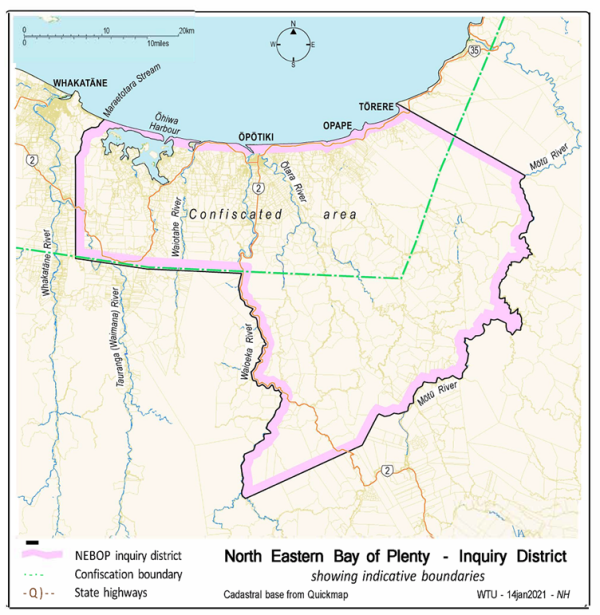North-Eastern Bay of Plenty
Claims and geographical area
The North-Eastern Bay of Plenty (Wai 1750) district inquiry involves approximately 30 claims including those from Whakatōhea and Ngāi Tai claimant groups. See a list of the claims (Wai 1750, #2.5.90(a))(external link).
The inquiry district boundary is broadly defined by the boundaries of the adjacent Te Urewera (Wai 894), Ngāti Awa (Wai 46), and Tūranganui-a-Kiwa (Wai 814) district inquiries and from the latter’s northernmost point by a straight line to the coast just north of Tōrere. The boundary in the west includes the whole of Ōhiwa Harbour (and surrounds, including Hiwarau) to the Maraetōtara Stream. In some cases, claims concerning grievances arising in areas adjacent to the inquiry district will also be heard. See a map of the indicative district inquiry boundaries below.

Major issues
The following general themes emerge across the claims as they apply in this inquiry district (presented in no particular order):
- political engagement between North-Eastern Bay of Plenty hapū and iwi and the Crown;
- impacts of raupatu (confiscation of lands);
- nineteenth-century native land legislation and its impacts;
- twentieth-century land legislation and its impacts;
- public works takings and its impacts;
- local government issues;
- environmental issues; and
- health and socio-economic issues.
Panel members
The presiding officer of the North-Eastern Bay of Plenty district inquiry is Judge Michael Doogan(external link). The panel also includes:
Inquiry progress
The Tribunal initiated the North-Eastern Bay of Plenty district inquiry on 4 June 2019. Read the June 2019 memorandum (Wai 1750 #2.5.1)(external link)
In June 2020, the Tribunal confirmed that the inquiry’s research programme would focus on nineteenth-century claims issues including tribal landscapes, political engagement, raupatu, land alienation, environmental issues and local government matters. A report on economic development, access to social services, and cultural impacts in the district from the nineteenth-century to the present is also underway. The technical research is now mostly completed, with supplementary research still in progress. All outstanding research reports are scheduled to be filed with the Tribunal by late 2024.
Priority Report, 2021
In July 2021, Judge Doogan granted priority to hear claims regarding the Whakatōhea Treaty settlement process. The Tribunal received eight claims for this priority inquiry and granted 35 parties ‘interested party’ status. In December 2021, the Tribunal released The Priority Report on the Whakatōhea Settlement Process in prepublication format. The report addressed two issues. The first set of issues related to the implications of settlement legislation on the Tribunal’s jurisdiction to inquire into historical claims and the Crown’s proposal to restrict the Tribunal’s recommendatory powers on historical claims or issues of claim. The second set of issues concerned the mechanism in the Deed of Settlement that would allow hapū to withdraw from settlement negotiations, and the role of hapū in the ratification process for the Deed of Settlement.
The Tribunal found overall that the Crown’s offer of a parallel process represented a rare opportunity for Whakatōhea to retain access to the Tribunal inquiry while Treaty settlement negotiations were underway. However, the Crown’s condition on its offer of a parallel process – that the Tribunal could not make recommendations on historical claim issues – was not seen as fair and reasonable. The Tribunal, though, did not consider this a breach of the Treaty as Whakatōhea would make the final decision on whether to accept the parallel process. With respect to which hapū could withdraw their mandate from the Whakatōhea Pre-settlement Claims Trust, the Tribunal found that certain aspects of the mechanism – including the withdrawal threshold and the withdrawal process – breached the Treaty principles of partnership and active protection. The Tribunal concluded that the Crown’s conduct had fallen short of Treaty compliance in certain regards but that small yet crucial changes to its settlement process could remedy the prejudice to Whakatōhea and enable the settlement of their long outstanding Treaty grievances in a fair manner.
The ongoing district inquiry
Between June 2022 and June 2023, the Tribunal heard Ngā Kōrero Tuku Iho evidence over seven hearings held at marae throughout the inquiry district. In this inquiry phase, the Tribunal heard oral history and evidence from tangata whenua relating to tribal identity and history, migration and settlement patterns, traditional rohe and mana whenua, relationships with neighbouring iwi and hapū and with the environment and wāhi tapu.
In the next phase of the inquiry, the Tribunal will hear claims on alleged Crown Treaty breaches and the associated impacts on whānau, hapū, and iwi claimants.
Hearings and events
See the Waitangi Tribunal Hearing Calendar for scheduled hearings.
For further information on the North-Eastern Bay of Plenty inquiry please contact the Registrar at the email address below for ‘Inquiry requests’.
Document requests:
For all document requests for this inquiry, email: WT_Requests@justice.govt.nz
Inquiry requests:
For all inquiry related requests, email: WT.Registrar@justice.govt.nz